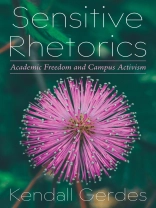Claims that students are too sensitive are familiar on and around college campuses. The ideas of cancel culture, safe spaces, and political correctness are used to shut down discussion and prevent students from being recognized as stakeholders in higher education and as advocates for their own interests. Further, universities can claim that student activists threaten academic freedom. In <i>Sensitive Rhetorics</i>, Kendall Gerdes<i> </i>puts these claims and common beliefs into conversation with rhetorical theory to argue that critiques of sensitivity reveal a deep societal discomfort with the idea that language is a form of action. Gerdes poses important questions: What kind of harm can language and representation actually do, and how? What responsibilities do college and university teachers bear toward their students? <i>Sensitive Rhetorics</i> explores the answers by surfacing submerged assumptions about higher education, the role of instructors and faculty, and the needs of an increasingly diverse student body.
เกี่ยวกับผู้แต่ง
<b>Kendall Gerdes </b>is assistant professor of writing and rhetoric studies at the University of Utah, coeditor of <i>Reinventing (with) Theory in Rhetoric and Writing Studies</i>, and a lifetime member of the Rhetoric Society of America.<b></b>












